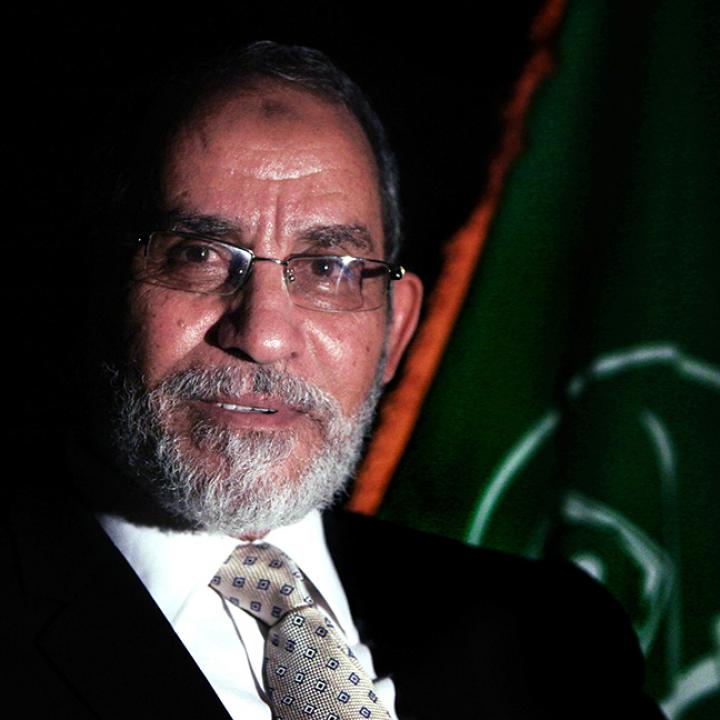
- Policy Analysis
- Articles & Op-Eds
Egypt's Muslim Brotherhood and Its Record of Double-Talk

For the time being, Washington should pay no attention to anything Egypt's Muslim Brotherhood says in English and little attention to any private "assurances" it offers.
Amid new strains in U.S.-Egypt ties, some in Washington are studying the tensions and results of recent voting for indications that democracy can take hold. Those who say the Muslim Brotherhood is showing new signs of moderation should compare its message to outsiders, in English, with its message to Egyptians and other Arabs, in Arabic.
Take the Brotherhood's official English and Arabic Web sites, IkhwanWeb (http://www.ikhwanweb.com/) and IkhwanOnline (http://www.ikhwanonline.com), from one day this month. In English, the home page featured no fewer than eight articles on the solicitude of the Brotherhood toward Egypt's Coptic Christian minority. The Arabic home page, by contrast, included just two small pieces on this theme. The contrast is sharper on other key issues. On democracy, the English home page one January day featured several articles with headlines such as "Why Islamists Are Better Democrats" and "Democracy: One of the Objectives of Shariah?" There was nothing comparable in Arabic. Instead, Arabic readers saw three pieces against freedom of the press, attacking two top independent Egyptian dailies for printing criticisms of the Brotherhood.
This kind of double talk is part of a pattern. Last February, right after Hosni Mubarak was overthrown, the Brotherhood published what it called an English-language version of Supreme Guide Mohammed Badie's message to the Egyptian people, celebrating their revolution. In that version, he supposedly spoke mainly of democracy, tolerance, pluralism and coexistence between Egypt's Muslims and Christians. But the text of his statement, published simultaneously in Arabic, had a totally different tone. In his authentic message, Badie wrote at great length on how Egypt's uprising was a blessing from Allah -- and how much Egyptians needed to stay firm in their Muslim faith to reap its real rewards. The following headlines on the Brotherhood's Freedom and Justice Party (FJP) led the English site in recent months: "FJP and Christians Stem Sedition," "FJP Denounces Attack on Israeli Embassy" and "FJP Women's Committee Provides Free Medical Services in Sharqiyyah City." But not one of those stories appeared on the Arabic home page. Throughout the past year, women often are referred to by the Brotherhood in English -- but almost never in Arabic. The same is true for the English and Arabic Web sites of the FJP, which now controls Egypt's parliament.
Some might note that all political parties, to at least an extent, engage in mixed messaging. But when this degree of duplicity is demonstrated, the group's credibility is, or should be, compromised accordingly. Some will say the Brotherhood includes some relatively moderate voices. True, but it is a very disciplined, hierarchical movement: Many of its moderates have left in the past year or have been expelled, and its most senior leaders are the hard-liners. Some will continue to say the Brotherhood is demonstrating that it can modify its positions. But as the movement has gained strength on the street and at the polls in recent months, the modification is mainly less moderate, not more.
For example, the Brotherhood belatedly joined the protests in Tahrir Square, but after Mubarak fell, its leaders opposed any "supraconstitutional" guarantees of individual freedoms and then barred members from further demonstrations. The group initially said it wanted no more than 30 percent of the seats in parliament; then switched to around half; then said maybe a majority, but in coalition with others; and now is drifting toward exercising complete control by taking the most important leadership and committee positions without having established formal coalitions with other parties. As for the upcoming presidential election, the Brotherhood once said it would not participate, then said it might support one of the existing candidates; now it appears it might search for a yet-unmentioned candidate of its choosing.
Meanwhile, one thing that has not changed is the Brotherhood's hostility toward U.S. policies and interests. In its electoral platform, the FJP begins its section on "Regional Leadership" by explicitly rejecting the old regime's approach of "supporting occupiers and colonisers, through its presence in the so-called axis of moderation, which is sponsored by the United States." In August, the Brotherhood called U.S. funding for Egyptian nongovernmental organizations "a disgrace." In its supposed denunciation of the violent police crackdown on NGOs in December, it nevertheless reaffirmed its continuing opposition to this funding.
Of course, it would be a welcome surprise if the Brotherhood does change into a more truthful and trustworthy interlocutor. In the meantime, however, we should pay no attention to anything the Brotherhood says in English and little attention to any private "assurances" it offers. And given the group's record of double-dealing, observers should take everything the Brotherhood says in Arabic with due doubt. The United States has to deal with the Brotherhood, but we don't have to trust anything it says -- at least until it proves we should.
David Pollock is the Kaufman fellow at The Washington Institute, focusing on the political dynamics of Middle Eastern countries.
Washington Post



